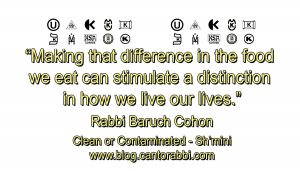CLEAN OR CONTAMINATED – Sh’mini – Lev. 9—11, by Rabbi Baruch Cohon
Our Torah reading this week brings us both drama and detail. After we
learn about the public pageant of dedicating the Tabernacle, and the
tragic death of Aaron’s two oldest sons, we then proceed to review all
the dietary laws, the Biblical basis of what constitutes Kosher food.
Here in Chapter 11 the Torah sets standards of acceptability for game
animals, cattle, sheep, goats, birds, fish and insects. In order to
qualify as food for Israelites, an animal, whether wild or domestic,
must have cloven hooves and must chew the cud. Those who show both of
these requirements are ta-hor – clean – and if slaughtered properly
they may be eaten. If they have only one of the requirements, — the
cloven hoof but not the cud chewing, or vice versa, they are rejected
as ta-mey – contaminated. Not only should they not be eaten, but
their carcasses should not be touched, otherwise the Israelite who
touches them is contaminated too. Those rejected include camels and
rabbits, and of course pigs.
Specific requirements for ocean-going prey are just as basic. Fish
must have both fins and scales. Any water-borne creature that lacks
one or both of these features is classified as ta-mey.
Here we will also read about contaminated birds and rodents and
reptiles that are not to be eaten. Insects we might expect to be on
the contaminated list, and many of them are. But the Torah permits
eating some insects that have 4 legs and knees that bend, one familiar
example being the grasshopper. It was several centuries later that
the rabbis removed grasshoppers from the menu, since most people were
not able to distinguish properly between different insect species.
The detailed standards laid out in this week’s Sedrah stimulated
volumes of discussion. Whole tractates of the Talmud define and
debate how those standards should be applied. As we review them this
week, we need to witness how our ancestors implemented the principle
of personal purity. How they undertook to be clean, and not
contaminated.
Our Torah reading implies that physical cleanliness leads to spiritual
purity. As we are reminded by our commentators, we therefore wash
our hands before pronouncing the blessing over bread to start our
dinner. Interestingly enough, the b’rakha we recite makes no mention
of our spiritual condition. It merely expresses our gratitude for a
Divinely created nature that “brings forth bread from the earth –
hamotzi lekhem min ha-aretz.” But stuffing your face without
acknowledging the source of life can work to contaminate your spirit.
The very last sentence of this week’s reading names its purpose:
L’havdil – “to make a difference between the clean and the
contaminated.” Making that difference in the food we eat can
stimulate a distinction in how we live our lives.
Hallevye omeyn – So may it be.



